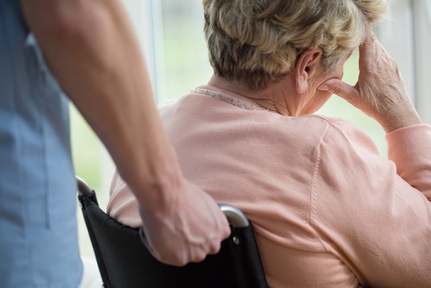Over 1.5m elderly have to reduce or stop social care as cost of living crisis soars
As one in 10 older people in the UK are reducing or stopping their social care or expect to do so in the coming months, Age UK warns it will be "inevitable" some "older people will suffer" piling extra pressure on the NHS.

A new poll published by Age UK found nearly nine million people who are over 60 said they believed that cost of living increases would affect their health and care needs over the winter and 2.5 million older people are already skipping meals or expect to do so over the same time period.
The poll also shows 22 per cent (3.6 million) of older people are already reducing or stopping spending on medications or specialist foods or expect to do so in the coming months.
One patient told the charity: “Sometimes I don’t take my painkillers or eye drops because they are too expensive. I cannot afford them.”
’Care workers are the only visitors many older people receive’
Age UK says it is “alarming” over a million and a half of older people are already cutting back or stopping their social care across the UK because they can’t afford the cost. This is “potentially disastrous” for an older person with care needs as “cutting back or stopping care in this situation threatens to pile” extra pressure on the NHS and hospitals as it greatly increases the chances of serious ill health and injury.
Caroline Abrahams, charity director at Age UK said: “Without the care they require, frail and unwell older people are more likely to fall, become malnourished and dehydrated, fail to take their medication and become seriously ill because an emerging health problem will not be noticed early enough.
“Care workers are the only visitors many such older people receive each day and they play a vital role in sustaining their mental and physical health. Without them, it’s inevitable that some older people will suffer, invisible and unseen, behind closed doors.
“Trying to save money by deliberately missing meals or cutting back on the specialist food they require, for example, because of coeliac disease, is also likely to undermine an older person’s health at a time when they need to stay strong to ward off the cold, plus all the winter bugs.”
'The cost of living crisis has made everyday purchases more expensive'
The latest monthly report from the British Retail Consortium and the data firm Nielsen shows UK food price inflation has soared to a record annual rate of 11.6 per cent in October with staples such as tea bags, milk and sugar becoming more expensive.
“The problem is the cost of living crisis has made everyday purchases more expensive and many older people living on low and modest incomes are finding it impossible to cope, with worse likely to come as they need their heating on more during the chilly weather,” says Ms Abrahams.
“Rising prices are hitting care providers too and they are increasing their fees accordingly. Older people without much money face really difficult choices about how to afford the basics and some are now clearly choosing to reduce or give up their care, because this seems to them like their ‘least worst’ choice, though it carries appreciable risk.”
To protect both older people and the NHS, Age UK is calling on the new government to restore the triple lock and raise benefits and social care funding in line with inflation at the Autumn Statement on 17 November.
“There’s no doubt that not to do so would be a false economy so far as the NHS is concerned, as well as severely jeopardising older people’s health.”
“The new government must understand just how high the stakes now are,” added Ms Abrahams.
A government spokesperson said: “Social care is a top priority and we are committed to bolstering the workforce and protecting people from unpredictable care costs – backed by £5.4 billion.
“To help with rising costs, we have provided at least an extra £1,200 in cost-of-living support to eight million of the most vulnerable households, reversed the rise in national insurance contributions, and made changes to universal credit to help working households keep more of what they earn.”
To read the report, click here
Latest News
 29-Jul-24
Dementia Bus gives carehome.co.uk staff insight into life with dementia
29-Jul-24
Dementia Bus gives carehome.co.uk staff insight into life with dementia
 27-Jul-23
UK's top home care agencies in 2023 revealed
27-Jul-23
UK's top home care agencies in 2023 revealed
 30-Nov-22
A quarter of older people keep their falls secret from family
30-Nov-22
A quarter of older people keep their falls secret from family
 29-Nov-22
'Covid-19 has not gone away' say terminally ill
29-Nov-22
'Covid-19 has not gone away' say terminally ill
 28-Nov-22
IT consultant who received poor care opens 'compassionate' home care business
28-Nov-22
IT consultant who received poor care opens 'compassionate' home care business